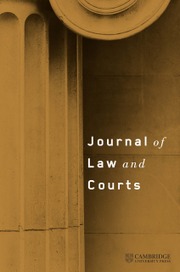Article contents
Giving Succor to Extremism?
Judicial Behavior toward Extreme Speech in Constitutional Democracies
Published online by Cambridge University Press: 21 October 2022
Abstract
Free speech is essential to democracy and political participation. But scholars hold competing expectations about whether courts will protect free speech in similar ways for extremism. Drawing on free speech cases from high courts in Australia, Canada, India, and South Africa, as well as from the European Court of Human Rights, I show that judges are substantially less likely to support free speech in cases involving extremist claimants or extreme speech. Moreover, I demonstrate how judges tailor arguments in response to concerns about extremism. This evidence has implications for our understanding of judicial behavior and the role that courts play in preserving democracy.
- Type
- Articles
- Information
- Copyright
- © 2022 Law and Courts Organized Section of the American Political Science Association. All rights reserved.
Footnotes
This article draws on research supported by the National Science Foundation (SES-1535250). Replication materials are available in the JLC Dataverse at https://dataverse.harvard.edu/dataset.xhtml?persistentId=doi:10.7910/DVN/ZSQ6O3. The author is grateful to Farzin Shargh for excellent research assistance. He is also grateful for the helpful feedback provided by Gretchen Helmke, Matthew Ingram, Tom Keck, Didi Kuo, Julie Novkov, Claire Sigsworth, Kris-Stella Trump, participants at the conference “Political Institutions and Challenges to Democracy,” and the anonymous reviewers.
References
- 1
- Cited by


